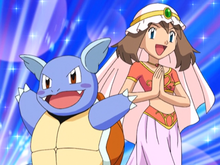Appeal: Difference between revisions
| Line 319: | Line 319: | ||
==In other languages== | ==In other languages== | ||
{{langtable|color={{contest color light}}|bordercolor={{contest color}} | {{langtable|color={{contest color light}}|bordercolor={{contest color}} | ||
|zh_cmn=表演 ''{{tt|Biǎoyǎn|Performance}}'' | |||
|fi=Esiintyminen | |fi=Esiintyminen | ||
|fr=Charme | |fr=Charme | ||
Revision as of 04:17, 9 April 2019
Appeal (Japanese: アピール Appeal) is a property that determines the amount of points a move earns when performed in front of a judge or panel of judges in a Pokémon Contest, Super Contest, or Contest Spectacular. It also refers to the act of performing a move.
Across the three generations of games in which appealing has appeared, it varies greatly. In the anime, however, it is the same in all Pokémon Contests seen so far, varying only in the amount of moves a Pokémon may use, or the number of Pokémon a Coordinator must use.
In the games
| ||||||
Pokémon Contest
| ||||||
Super Contest
| ||||||
Contest Spectacular
| ||||||
In Hoenn's Pokémon Contests and Contest Spectaculars, there are five rounds of appealing, while Sinnoh's Super Contests have four. In both regions, Coordinators have their Pokémon performing one move in each round in order to impress the Judges and the audience.
Every move that a Pokémon can learn is categorized under one of the five Contest categories and adds Appeal Points to a Pokémon's score in a Contest. The table on the right shows the Appeal Points and other Contest properties of the move Ice Beam.
Pokémon Contests
In Hoenn, Pokémon take turns appealing in the secondary judging, known as the Talent Round (Japanese: アピール審査 Appeal Examination) in Pokémon Omega Ruby and Alpha Sapphire. They are able to affect the performances of each other. Effects on other Pokémon include reducing their number of hearts, making them nervous, and so forth.
Move combinations score extra hearts. Moves that are of the same category as the Contest the user is competing in may excite the audience, and if the audience becomes extremely excited, the Pokémon scores extra hearts.
Internally, each heart is worth 10 points in the appeal score for a Pokémon.
Turn order
In the first round, the turn order is determined by how well each Pokémon did in the primary judging, with the Pokémon who did best in primary judging being placed first in order. In the rounds after the first, they are ordered from who won the most hearts to the least in the preceding round. The turn order can be changed by:
- Moves which make the user move first in the next round. Examples include Quick Attack and Shadow Sneak.
- Moves which make the user move last in the next round. Examples include Dragon Tail and Vital Throw.
- Moves which scramble the order on the next round. Examples include Confuse RayRSE and Wonder Room.
Secondary effects that affect appeal
Certain moves can impose statuses on the user or other Pokémon.
- If a move a Pokémon uses makes it "settle down just a bit" (indicated by a
 icon)RSE, or "feeling pretty calm and collected now" (indicated by a teardrop icon)ORAS, it prevents one jamming from another Pokémon's move; after a single jam occurs and is prevented or the round is over, the Pokémon loses this protection. Examples include Protect and Refresh.
icon)RSE, or "feeling pretty calm and collected now" (indicated by a teardrop icon)ORAS, it prevents one jamming from another Pokémon's move; after a single jam occurs and is prevented or the round is over, the Pokémon loses this protection. Examples include Protect and Refresh. - If a move a Pokémon uses makes it "become oblivious to others" (indicated by a
 icon)RSE, or "completely oblivious to other Pokémon's moves" (indicated by a teardrop icon)ORAS, it prevents the user from being jammed at all during the entire round. Examples include Detect and Mist.
icon)RSE, or "completely oblivious to other Pokémon's moves" (indicated by a teardrop icon)ORAS, it prevents the user from being jammed at all during the entire round. Examples include Detect and Mist. - If a move a Pokémon uses tries to jam another Pokémon, the other Pokémon or the user (if the move backfires) is indicated by a
 icon. In Pokémon Omega Ruby and Alpha Sapphire, the move cannot backfire on the user and all jammed Pokémon will be indicated with a swirly spiral icon. A move can only jam Pokémon who have already showed their appeal during the round.
icon. In Pokémon Omega Ruby and Alpha Sapphire, the move cannot backfire on the user and all jammed Pokémon will be indicated with a swirly spiral icon. A move can only jam Pokémon who have already showed their appeal during the round. - If a Pokémon becomes nervous due to another Pokémon's move (indicated by a
 icon), it cannot move during the round. A move can only unnerve the remaining Pokémon who have not yet showed their appeal during the round. The move may fail to unnerve any of the remaining Pokémon, and Pokémon who are pumped up are less susceptible to nervousness. Examples of moves include Sing and Sweet Kiss.
icon), it cannot move during the round. A move can only unnerve the remaining Pokémon who have not yet showed their appeal during the round. The move may fail to unnerve any of the remaining Pokémon, and Pokémon who are pumped up are less susceptible to nervousness. Examples of moves include Sing and Sweet Kiss. - If a move a Pokémon used in the previous round renders it unable to appeal in the current round, it is indicated by a
 icon or a non-moving spriteRSE.
icon or a non-moving spriteRSE. - If a move a Pokémon uses raises its conditionRSE, or gets the Pokémon "pumped up"ORAS, successive moves for the remainder of the Contest will add one extra heart of appeal. The user will be indicated with a star icon. The Pokémon can continue to get pumped up to earn more stars. (For instance, the user can use Dragon Dance twice and will be indicated with two star icons. Successive moves will earn two extra hearts of appeal.) Pokémon who are pumped up are less likely to become nervous. Examples of moves include Dragon Dance and Hone Claws.
Other effects which influence appeal include:
- Certain moves make the Pokémon more aware of the other Pokémon's moves. If a move which jams is used after that Pokémon for the rest of the round, double the amount of points are lost than normal. Examples of moves include Take Down and Draco Meteor.
- Certain moves prevent the user from appealing next round. Examples include Hyper Beam and Giga Impact.
- Certain moves prevent the user from appealing for the rest of the Contest. Destiny Bond, Self-Destruct and Explosion have this effect.
- Certain moves provide more hearts depending on when the Pokémon executes its move. Moves such as Grassy Terrain and Wish excite the audience a lot if used first and will give the user an extra two hearts. Similarly, moves such as Disarming Voice give six hearts if used first but only two otherwise.
- Certain moves provide a random number of hearts. Examples include Fury Swipes and Sleep Talk.
Judge's reactions
- Main article: Contest Judge
In Ruby, Sapphire, and Emerald, a Judge is present who will react in different circumstances. In Omega Ruby and Alpha Sapphire, the Judge is not present, though the effects such as changing turn order and contest combinations effects are similar.
Audience

The audience's excitement over a Pokémon's appeal influences the number of hearts it earns. This is shown by the excitement meter, a series of five ovalsRSE or starsORAS that may be filled or emptied.
Performing a move whose category is the same as the category of the Contest causes the excitement meter to go up by 1. Moves that are of the two adjacent categories do not affect the excitement meter, while moves that are of the two opposing categories causes the excitement meter to go down by 1. Filling this meter earns an additional heart, while in Omega Ruby and Alpha Sapphire, emptying it deducts a heart from the Pokémon's score.
In Ruby, Sapphire and Emerald, Return and Frustration raise the excitement meter by 1 regardless of the Contest category.
If a Pokémon uses a move and the excitement meter reaches five, the Pokémon receives six extra hearts during its appeal, and the excitement meter returns to zero. If a Pokémon uses a move twice in a row, the judge will be disappointed and the excitement meter will not go up, regardless of the move's Contest type. However, it can still lower the excitement meter.
Spectacular Talent
In Pokémon Omega Ruby and Alpha Sapphire, a special animation known as a Spectacular Talent (Japanese: ライブアピール Live Appeal) is displayed when the excitement meter reaches five, depending on the category of the Contest Spectacular and the type of the Pokémon who filled the meter. If the Pokémon has two types, it is randomly selected between the two. For example, a Normal-type Pokémon's animation features the Pokémon running across the floor in zig-zags, and is called "Incredible Shining Road" in Coolness Contests.
If a Pokémon is able to Mega Evolve and is holding the correct Mega Stone, the Pokémon will Mega Evolve before performing its Spectacular Talent and gain eight hearts instead of six; it will remain Mega Evolved for the rest of the Talent Round. If a Pokémon's Mega Evolution changes its type, the Spectacular Talent chosen will be chosen from one of the Mega-Evolved Pokémon's types.
| Type | Spectacular Talent | ||||
|---|---|---|---|---|---|
| Coolness | Beauty | Cuteness | Cleverness | Toughness | |
| Normal | Incredible Shining Road | Graceful Shining Road | Pretty Shining Road | Bright Shining Road | Strong Shining Road |
| Fighting | Grand Advance | Uplifting Dawn | Charming Onslaught | Tactical Approach | Ballistic Bullet |
| Flying | Glorious Skies | Celestial Skies | Pleasant Skies | Keen Skies | Intrepid Skies |
| Poison | Toxiquad CL | Venin Quartet BT | Poison Orbit CN | Vitriolic Division CV | Blighted Force TG |
| Ground | Planet Burst | Global Shuddering | Shaky Ground | Tectonic Shift | Supershear Quake |
| Rock | Rising Above | Roaring Fantasia | Echo Ridge | Ambient World | These Stone Walls |
| Bug | Cool Chrysalis | Radiant Emergence | Sweet Unfurling | Intellectual Awakening | Bold Transformation |
| Ghost | Accursed House | Nightmare Dawn | Midnight Revels | Evil Rituals | Agony Theater |
| Steel | Clarior E Tenebris | Luceat Lux Vestra | Amor Vincit Omnia | Scientia Potentia Est | Audaces Fortuna Iuvat |
| Fire | Splendid Inferno | Exquisite Inferno | Scintillating Inferno | Philosophical Inferno | Devouring Inferno |
| Water | Amazing Blessed Rain | Serene Blessed Rain | Pattering Blessed Rain | Clear Blessed Rain | Soaking Blessed Rain |
| Grass | Fresh Flower Garden | Cultured Flower Garden | Enchanting Flower Garden | Blooming Flower Garden | Impressive Flower Garden |
| Electric | Striking Chronicles | Lightning Dazzle | Glittering Rhapsody | Electrodynamic Archives | Thunderbolt Aftershock |
| Psychic | Techno | Serenade | Lullaby | Madrigal | Anthem |
| Ice | Sublime Iceberg | Glistening Icicles | Twinkling Diamonds | Acute Frost | Powerful Blizzard |
| Dragon | Doom Incarnate | Regal Courtesy | Passionate Archetype | Proven Sagacity | Agent of Divinity |
| Dark | Moonlit Pledge | Moonscape Reflection | Moonrise Beckoning | Moonbright Vision | Moonshadow Sorrow |
| Fairy | Awesome ★ Adventure | Elegant ★ Outing | Delightful ★ Wandering | Intelligent ★ Expedition | Heroic ★ Journey |
Gallery
The animation is the same regardless of the Contest category except for some unique background features, with Coolness Contest Spectacular Talents featuring red sparkles, Beauty with translucent circles, Cuteness with love hearts, Cleverness with numbers and complex mathematical and chemical symbols, and Toughness with orange streaks.
| Normal | Fighting | Flying | Poison | Ground | Rock |
|---|---|---|---|---|---|

|
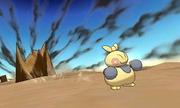
|

|

|
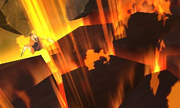
|

|
| Bug | Ghost | Steel | Fire | Water | Grass |

|
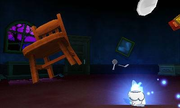
|

|

|

|
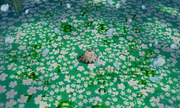
|
| Electric | Psychic | Ice | Dragon | Dark | Fairy |
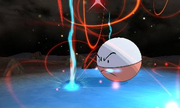
|
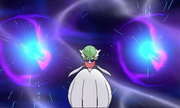
|

|
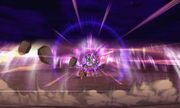
|
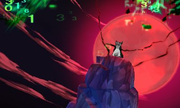
|
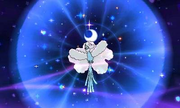
|
Pokémon Super Contests
In Sinnoh, Pokémon perform their moves in the Acting Competition (Japanese: 演技審査 Performance Examination). At the end of each round, the Judges award extra points to the Pokémon: 3 points if only one Pokémon performed to them, 2 points each if two Pokémon performed to them, 1 point apiece if three Pokémon performed to them, and none if all Pokémon performed to them.
Contrary to the Hoenn region Contests, the Pokémon get their position by their scoring in reverse: the best scorer goes last and the worst scorer goes first.
Performing a compatible move (i.e. a move that is of the same category as the Contest) to any Judge causes their Voltage to go up by 1, however, a move from the opposite side of the Contest category spectrum causes the Voltage to go down by 1. The Pokémon who fills the Voltage meter will receive a bonus from the Judge they performed to: Keira and Jordan give +5, while Dexter gives +8.
Unlike Generation III, a Pokémon cannot perform a move more than twice in a row for any reason. A Pokémon may not enter a Super Contest (including Visual and Dance practice sessions) if they only have one move; this makes it impossible for Ditto and Unown to legally obtain any Super Contest Ribbon.
The number of points earned from the Acting Competition is 10 times the number of hearts received.
In the anime
In the anime, the Performance Stage (Japanese: アピールステージ Appeal Stage) is the round in which Coordinators must deliver a performance that showcases the charms of their Pokémon in order to appeal to the judges. The object of the round is to show off the Pokémon in a visually impressive manner, a task that involves displaying an array of moves to demonstrate the Pokémon's style and skill while simultaneously highlighting its appearance. In the Advanced Generation series, this round was referred to as the Appeals Round instead.
During the Performance Stage, Coordinators are expected to exhibit their Pokémon's moves creatively. To improve their chances of succeeding in this round, they will often develop unique move collaborations. Coordinators can also use props such as juggling balls and flying discs to assist them during performances. Since a Pokémon's overall appearance is also evaluated, Coordinators will groom their Pokémon and feed them Pokéblocks and Poffins to keep them healthy.
The performances are assigned scores by a panel of judges, usually formed by the Chief of the Pokémon Activities Committee, Mr. Contesta; the President of the Pokémon Fan Club, Mr. Sukizo; and the operator of the local Pokémon Center, Nurse Joy. When analyzing a performance, the judges take into account the Pokémon's entry and the level of cooperation between Coordinator and Pokémon, among other aspects.
The Coordinators with the highest scores proceed to the second round, known as the Battle Stage. The number of Coordinators that advance to the second round varies depending on the competition. After the results are announced by the master of ceremonies, the Coordinators are paired randomly by a computer to compete in single-elimination Contest Battles.
In the Diamond & Pearl series, Double Performances were introduced. In competitions following the format, Coordinators have to send out two Pokémon at once.
Trivia
- For Mounting a Coordinator Assault!, Professor Oak's Big Pokémon Encyclopedia is about the Appeals Round. He writes this Pokémon senryū about it: ポケモンが かれいにまわるよ コンテスト Pokémon spinning beautifully; that is a Contest.
In other languages
| ||||||||||||||||||||||||||||||
|
Acting Competition
|
Spectacular Talent
| |||||||||||||||||||||||||||||||||||||||||||||||

|
Pokémon Contests | 
| |
|---|---|---|---|
| Necessary Spoils Pokéblocks • Poffins Contest Categories Cool • Beautiful • Cute • Clever • Tough Rounds Appeal • Battle • Dance • Visual |
Participation Contest • Super Contest • Contest Show Coordinator • Contest Hall • Contest Pass The Grand Festival Kanto • Hoenn • Sinnoh Top Coordinator • Ribbon Cup | ||
| Others Combinations • Opponents (III • IV • VI • VIII) • Double Performance • Jamming Ribbons (list) • Stickers • Ball Capsules • Ranks • Judges • Announcers • Wallace Cup | |||

|
This game mechanic article is part of Project Games, a Bulbapedia project that aims to write comprehensive articles on the Pokémon games. |
